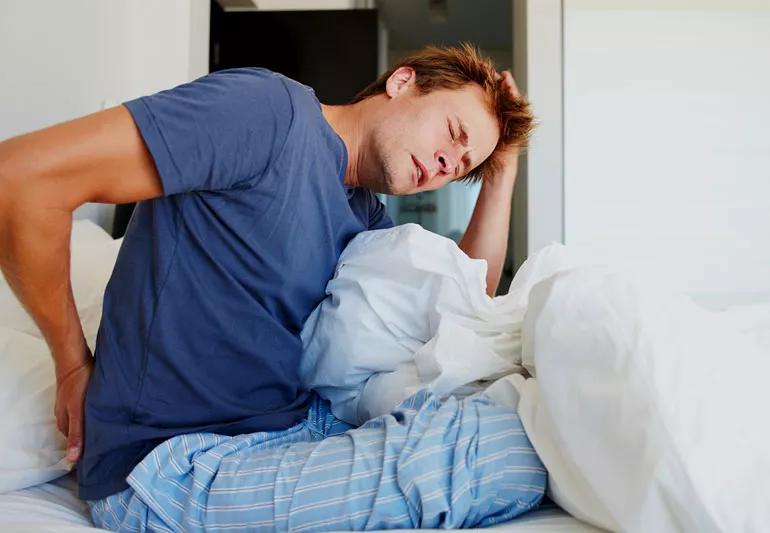The short answer from a rheumatologist

Image content: This image is available to view online.
View image online (https://assets.clevelandclinic.org/transform/32566f97-f7fc-47aa-a520-6ac9a57e5363/AnkylosSpond-171269149-770x553_jpg)
Man in morning with chronic back pain
A: Ankylosing spondylitis is a form of arthritis that causes inflammation of the spine, resulting in back pain and stiffness. It can also affect other joints.
Advertisement
Cleveland Clinic is a non-profit academic medical center. Advertising on our site helps support our mission. We do not endorse non-Cleveland Clinic products or services. Policy
There are many potential causes of back pain, which can make it tricky to diagnose. But often times, people with AS experience back pain that:
People who have AS may also experiences joint pain and swelling in other areas such as the hips or shoulders, as well as skin changes, eye changes or bowel issues.
A physician makes an AS diagnosis through a combination of a physical exam, blood work and imaging tests, such as MRI.
AS is progressive, and if it’s severe, it can cause the bones of the spine to fuse over time. So early treatment is important to prevent disability and reduce pain and stiffness. Treatment may include:
Treatment starts with an accurate diagnosis, so talk with your doctor if you’ve been experiencing any kind of chronic pain.
— Rheumatologist Margaret Tsai, MD
Advertisement

Sign up for our Health Essentials emails for expert guidance on nutrition, fitness, sleep, skin care and more.
Learn more about our editorial process.
Advertisement
Some diets are better than others, but it comes down to what works best for you
Pilates, stretching and hydrotherapy can support your spine and maintain a wide range of motion
Non-drug therapies like massage therapy and acupuncture can help manage pain, stiffness and fatigue
Doctors aren’t sure why, but the conditions are connected
Ease pain and stay active by keeping your spine in its proper position
About 35% of people with this autoimmune condition also develop uveitis
Managing the chronic pain of this autoimmune condition is important
Most recommended precautions center around minimizing bruising or swelling
Type 2 diabetes isn’t inevitable with these dietary changes
Applying a hot or cold compress can help with pain
Pump up your iron intake with foods like tuna, tofu and turkey